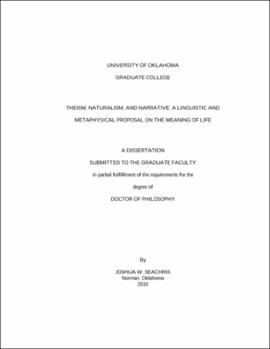| dc.contributor.advisor | Elugardo, Reinaldo | |
| dc.creator | Seachris, Joshua Wayne | |
| dc.date.accessioned | 2019-04-27T21:36:11Z | |
| dc.date.available | 2019-04-27T21:36:11Z | |
| dc.date.issued | 2010 | |
| dc.identifier | 99332802202042 | |
| dc.identifier.uri | https://hdl.handle.net/11244/319128 | |
| dc.description.abstract | This dissertation consists of two distinct yet related projects on the meaning of life. Part I centers on the challenge of understanding what the, admittedly, vague question, "What is the meaning of life?" is asking. This I call the linguistic project. After assessing the oft-repeated charge of incoherence, surveying extant interpretations of the question, and discussing other significant dialectical issues in Chapter One, I argue in Chapters Two through Four that the question should be understood as the request for a narrative of the world that sufficiently addresses those areas of greatest existential import to human beings. I call this the narrative interpretation, and propose it as a rival interpretive strategy to what I call, following R. W. Hepburn, the amalgam thesis . The amalgam thesis is the most common interpretive approach whereby the question, "What is the meaning of life?" is largely seen as a place-holder for a whole set of questions, such as, "Why are we here?" "What is the purpose of life?" and "What makes life worthwhile?" among others. On the amalgam thesis, the question is viewed as little more than a disjunctive question. In contrast, the narrative interpretation views the question as making a singular request. However, it is a request, the answer to which captures all of the intuitions and sub-questions thought to be relevant to the meaning of life under a single unifying construct (i.e., a narrative). After a detailed discussion of the necessary and sufficient conditions of the narrative interpretation, I enlist the concept of Weltanschauung in order to lend further philosophical plausibility to this interpretation. Finally, I consider several philosophical advantages it enjoys over the amalgam thesis. | |
| dc.description.abstract | In Part II (Chapters Five through Seven), I enlist my narrative interpretation in order to compare the two dominant metaphysical narratives in the West, namely, naturalism and theism, in its Christian instantiation. This I call the metaphysical project. These chapters are largely comparative rather than evaluative. Chapter Five primarily functions as a prolegomena for Part II where I (i) discuss important definitional matters surrounding naturalism and theism, (ii) consider how the concept of narrative maps onto entire metaphysical systems like naturalism and theism, and (iii) address Sartrian-type objections to life being anything like a dramatic narrative. In Chapter Six, I compare naturalistic and theistic constituent narrative elements on two of five narrative fronts that a narrative must narrate across in order to qualify as what I call a candidate meaning of life narrative (i.e., satisfies the right formal conditions). These two related fronts involve explanations of (i) Why the universe exists, and even the stronger, why anything exists at all, and (ii) what purpose(s) there is in life, if any. Finally, in Chapter Seven, I discuss the concept of narrative ending, and how it relates to the meaning of life. Here, I consider (i) the rationale behind why it is that the ending of a narrative is so important to broadly normative appraisals of the narrative as a whole, (ii) the respective "endings" of the naturalistic and theistic meaning of life narratives, (iii) how the evaluative significance of narrative ending provides a powerful way to frame perennial meaning of life discussions of death and futility within the more general territory of life's meaning, and (iv) how the evaluative significance of narrative ending sheds light on the relevance of incorporating eschatological considerations into the projects of theodicy and defense. | |
| dc.format.extent | 298 pages | |
| dc.format.medium | application.pdf | |
| dc.language | en_US | |
| dc.relation.requires | Adobe Acrobat Reader | |
| dc.subject | Life | |
| dc.subject | Meaning (Philosophy) | |
| dc.title | Theism, Naturalism, and Narrative: A Linguistic and Metaphysical Proposal on the Meaning of Life | |
| dc.type | text | |
| dc.type | document | |
| dc.thesis.degree | Ph.D. | |
| ou.group | College of Arts and Sciences::Department of Philosophy | |
